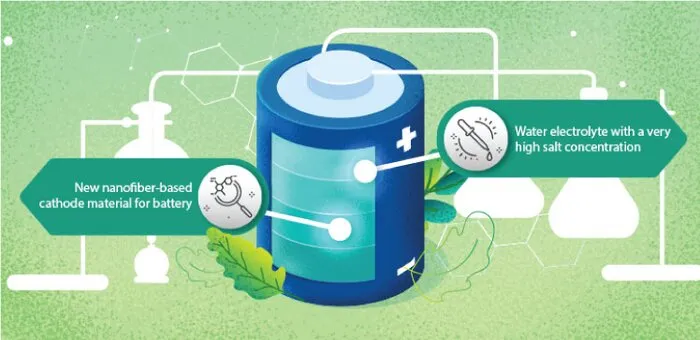Electric gains in battery efficiency
- A high-performance variation of the zinc-ion battery will enable stationary power storage space that assures to be less expensive, much safer and also a lot more environmentally friendly than lithium-ion batteries.

Until now, zinc-ion batteries have actually been badly hindered by their rapid degradation throughout use. Now, a KAUST team has established a brand-new electrolyte as well as electrode combination that boosted a number of facets of zinc-ion battery performance, especially the security over several fee and also discharge cycles.
To deal with these concerns, the group created a water electrolyte with a very high salt focus. The more salt ions present in the solution to bind surrounding water particles, the fewer free water particles are offered to harm the electrodes
As zinc salts commonly show limited solubility in water, the group added sodium to generate a highly concentrated electrolyte of zinc perchlorate and also sodium perchlorate. "We discovered this combination supplies extremely high solubility to suppress water task, without reducing the crucial characteristics of zinc-ion batteries, including their high ionic conductivity, safety or environmental kindness," Zhu claims.
In addition to the unique electrolyte, the group developed a new nanofiber-based cathode product for batteries. "The nanofiber morphology enhances ion diffusion, which makes sure quicker charge and also discharge prices of the aqueous Zn-ion batteries," Alshareef claims. In screening, the group saw practically no capacity degeneration over 2,000 fee cycles. "This combination of electrode as well as electrolyte possibly fixes the drawbacks of traditional liquid Zn-ion batteries," Alshareef says.
Fixed banks of batteries attached to renewable resource sources, such as solar installments or wind ranches, could be key to the transition from the present fossil-fuel powered electrical energy grid. Unlike batteries for mobile applications, such as laptops or electric cars and trucks where battery dimension and weight are key, fixed batteries can be reasonably huge as well as heavy, raising the possibility that different rechargeable battery modern technologies to lithium-ion could be deployed.
Batteries fixated a water-based solution of zinc ions have shown excellent potential for fixed storage space in terms of their high capacity, inexpensive and also lack of toxicity. "Yet problems including low biking stability as well as rapid self-discharge have actually restricted sensible applications of aqueous zinc-ion batteries," claims Yunpei Zhu, a research researcher in Husam Alshareef's team, that led the work. "Both of these issues relate to the design of electrolytes and also electrode materials," he adds. The water-based electrolyte triggered troubles at both electrodes of the battery, causing damaging side reactions at the anode and also rapid dissolution of the cathode.
Also read

